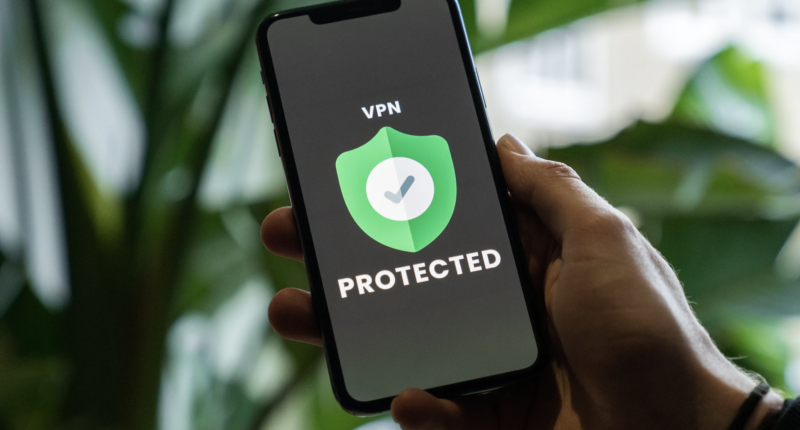“ARE VPNs legal in the UK?” and “what is a VPN” are typical questions you’ll here about these handy online tools – luckily, we’ve got all the answers listed below.
The goods news is that VPNs are pieces of software that will offer you far greater levels of online privacy and security, and best of all, they’re very simple to set up.
What is a VPN?
VPN stands for ‘virtual private network’.
It is software which when activated changes the “address” of a computer, laptop, tablet or mobile.
How does a VPN work
Software which uses VPN technology adds an extra layer of security to computers, laptops, tablets or smartphones.
VPNs make it much harder for snoopers to monitor your online activity, helping to protect personal data and information.
And because of an increase in concern around personal data protection – and keeping online activity from prying eyes – VPNs are more common than ever.
They can help secure your browsing on public WiFi (in cafes, shoppings centres or on public transport), and overseas – although they are banned in some countries.
But there is some confusion around whether VPNs are legal in the UK.
And there is some debate around what the best VPN service providers are too.
Who are the best UK VPN providers?
With so many VPN providers available, it can be tricky to choose the one which is right for you.
Our tech experts have tried and tested a number of them, which you’ll find in our pick of the best VPN services and our best VPN for Netflix articles.
Some offer better services for desktop computers, some offer mobile apps and features can differ.
Here’s a quick list of some VPNs that we have tested and can recommend:
Is using a VPN legal in the UK?
Using a VPN service isn’t illegal in the UK if it is used within legal guidelines.
You can own a VPN subscription and make use of it to add extra security to your own browsing at home or on the move.
But VPNs can be used to get around ‘geo-restrictions’ which prevent the watching of video content outside of certain countries – such as watching Netflix content that isn’t available in your own region.
While activities like this aren’t looked at fondly by streaming platforms, it’s not an illegal practise. Read our pick of the best VPNs for Netflix if this is something you’re interested in.
Around the world, VPN services are banned altogether in some countries – including North Korea and Iraq.
Meanwhile only government-approved services are allowed in countries including Russia, China and Turkey.
How to set up a VPN?
Most VPN programs have a very big and useful switch on/off button that you’ll be able to click on to enable default protection immediately.
In that case, you won’t have to worry about any particular option. The program will connect to the best available server, and your connection will become automatically secure. Piece of cake, right?
However, if you have particular needs related to location and/or services, you’ll want to specify particular options in the settings.
For how daunting that may sound, the truth is that VPN providers have come a long way from being tools for the tech-savvy, and most of them now have pre-set profiles specifically aimed at satisfying a particular need.
Do you need to look like you’re connecting from a different country? Just access the server list and select one located in the country you’re interested in.
How does a VPN work?
A VPN works by sending your internet access through a remote server – one that could be potentially located anywhere across the world.
This masks your IP addresses, thereby giving you extra levels of online security and added levels of re-assurance.
It’s worth noting that not even the VPN companies themselves can monitor your internet activity, as they (by and large) offer end-to-end encryption to their users.
However, it’s always worth looking at a VPN’s privacy policy before you make a purchase, and every now and again a company makes headlines by accidentally leaking its clients usage (though this is pretty rare with major and respectable brands).
How much does a VPN cost in the UK?
This can vary to a surprising degree: it really depends on the length of your desired subscription.
You can expect to pay £10.86 for a rolling month contract from ExpressVPN, £10.89 per month for CyberGhost and £10.37 per month for Surfshark.
But that figure drops to as little as a quarter or even a fifth if you commit to a longer-term plan that lasts either 12, 24 or 36 months.
This of course stands to reason: each VPN company wants yours business for as long as possible. That’s while you’ll often see ‘deals’ listed on those longer-period plans with huge percentage savings displayed.
Will a VPN make me entirely anonymous?
We live in a deeply interconnected world, and being completely anonymous online is a hard feat to achieve.
A VPN is a good step towards online anonymity, but it won’t do the trick just by itself.
This because a lot of information about you, for example, is revealed to third parties through your browser.
Choosing a secure browser is then one of the key steps you can take to avoid fingerprinting.
Closely related to that is targeted advertising. Apps and websites collect a lot of options about your personal taste through ads to help improve their suggestions.
You can solve this problem by installing an ad-blocker browser extension.
Therefore, using a VPN in addition to these other tools will aid you attaining greater anonymity online.
How to choose a good VPN
There are several factors, beyond price, you should consider when looking for a VPN.
First of all, most VPN services have limitations on the number of maximum simultaneous connections. If you’re relying on a VPN for all your devices make sure you select a service with multiple connections.
Secondly, you should check in which countries are the servers your VPN is using. Having several servers in one area may help spread the load, but does not necessarily mean faster performances, as more people may be using the service, thus making it slower.
Another, more technical factor regards the VPN’s connection protocols. Ideally, a good VPN should use either OpenVPN or IKeV2 protocols, but PPTP, L2TP AND SSTP are all valid options.
Finally, there’s privacy. VPN services are generally used to maintain users’ anonymity and privacy, but the truth is not all VPN providers delete all user data after they terminate a session. Make sure to read the company’s policy before start your first VPN surfing session.
LATEST IN TECH
VPNs can be used to access streaming content that’s not available in your region. To find out more, read our how to watch UK TV abroad and how to watch ITV abroad explainers.
Sky subscribers shouldn’t miss our article on how to watch Sky Go abroad.
This post first appeared on Thesun.co.uk










